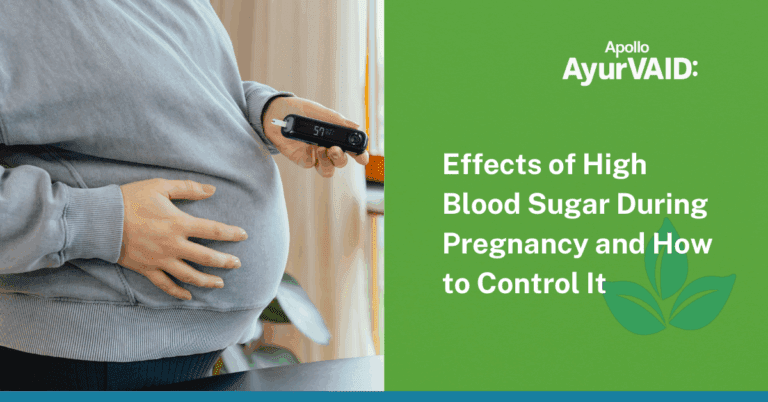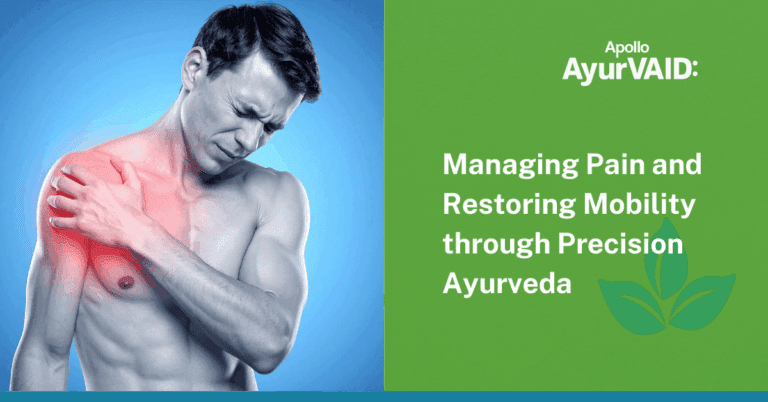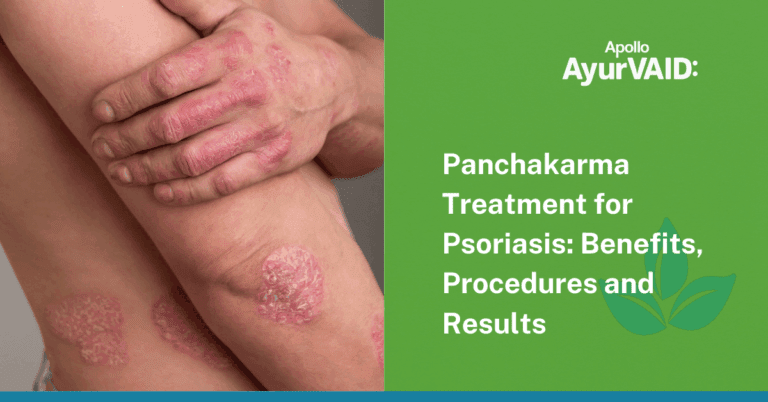Eczema isn’t only about the appearance — it can make daily life difficult and affect a person’s comfort, confidence, and well-being. The eczema-affected skin is often red, itchy, dry and scaly, and it most often flares on the hands, elbows, knees, face, and scalp. Conventional therapies help control symptoms, but most of them require patients to take medicines for a long time, which can cause side effects. For most, the main question is: What are the best natural remedies for eczema?
At this point, Ayurvedic treatment for eczema can be very helpful. Ayurveda views eczema as an indication of imbalance of Doshas (all 3 Doshas, especially Vata and Kapha). For those asking how to cure eczema fast at home, Ayurveda does not promise an instant cure, but it can help by gradually healing the body with detoxification, personalised care, and home remedies for eczema that fit your constitution. In this blog, let’s learn about eczema.

Understanding Eczema Through the Ayurveda Lens
Nidanas of Dosha Imbalance:
- Ahara (Dietary): Taking spicy, heavy, sour, fermented foods, and processed foods frequently; irregular eating times.
- Vihara (Lifestyle): Exposure to allergens, extremes of climate, improper hygiene, suppression of natural urges.
- Manasika (Psychological): Stress, anxiety, and disturbed sleep.
- Others: Ojas (immunity) depletion, hormonal imbalance, gut trouble, heredity.
Samprapti (Pathogenesis)
Eczema starts with Dosha aggravation and Agni Mandya (digestion disturbance) to accumulate Ama (toxins). These toxins block the body’s Srotas (channels), which prevents nourishment from reaching the skin and disturbs Ojas (immune) balance. Gradually, the skin barrier deteriorates, drying out and causing itching, flare-ups, and eczema for the long term. If untreated, the rise of Vata dominance thickens, roughens, and makes the skin almost unmanageable.
Ayurveda Treatment for Eczema: A Root-Cause Approach
Unlike quick fixes, Ayurvedic treatment for eczema aims to remove the underlying causes. It uses a multi-dimensional approach encompassing detoxification, balancing doshas, healing the skin, and building immunity. This treatment is not the same for everyone; instead, it is personalised according to one’s constitution (Prakriti) and symptoms.
At AyurVAID, the healing journey follows four structured steps:
- Whole-person health assessment
- Mapping the unique disease pathway (Disease Tree)
- Personalised, protocol-based care plan
- Ongoing monitoring and outcome tracking
Panchakarma: Deep Detox for Skin Health
The principal Ayurvedic treatment for eczema is Panchakarma, a series of procedures for the removal of impurities and re-establishment of disequilibrium. Depending on the Dosha predominance, these procedures are selected:
- Virechana is for Pitta-Kapha imbalance to clear heat and toxins; Pitta-Kapha may also undergo Vamana to eliminate excess Kapha.
- For Vata-Kapha imbalance, Snehapana, Nasya, and Anuvasana Vasti are used to nourish and stabilise.
When the case is chronic and severe, then Raktamokshana, especially by way of leech therapy (Jalaukavacharana), is done to extract vitiated blood and soothe the eruptions on the skin.
The procedures undo deep-seated impurity and thus reduce inflammation, itching, and recurrence.
Ayurveda also lays stress on natural remedies for eczema, comprising herbal formulations in conjunction with topical applications:
- Medicated ghee nourishes from within.
- Lepa (Herbal Pastes) like neem, turmeric, soothe inflammation and improve complexion.
These therapies provide a natural, drug-free approach to alleviate symptoms and foster healing.
Home Remedies for Eczema: Diet and Lifestyle Tips
- Grains: Wheat, barley, green gram, masur dal
- Vegetables: Ridge guard, bitter gourd, Indian gooseberry
- Fruits: Pomegranate, Indian Summer Berry (Phalsa)
- Others: Turmeric, neem, honey, aged ghee
Apathya (to be avoided)
- Heavy, spicy, sour, oily, fermented foods
- Fish, milk, jaggery, curd, and food are incompatible in combination
- Day sleeping, excessive exertion, and exposure to cold
Mild exercises, oil massages, and stress management practices such as yoga or pranayama are also to be included in daily life to avoid exacerbations and keep the skin healthy.
Diet and Lifestyle Adjustments
How to Cure Eczema Fast at Home?
Conclusion
If you are dealing with the frustrating cycle of eczema, Ayurveda can help in a caring and effective way. By using detoxification, balancing the doshas and customised care, Ayurveda helps people achieve real healing instead of just treating their symptoms.
If you want to try natural remedies for eczema or want to know how to cure eczema at home, first consult a qualified Ayurvedic doctor. Following a plan made for your body can help you achieve clearer skin and a better life, without using harsh treatments.







